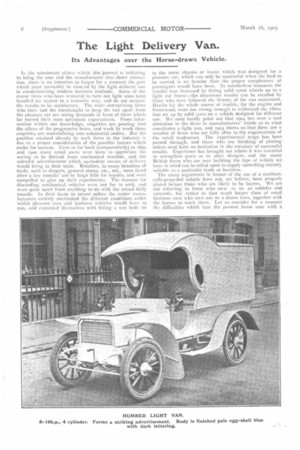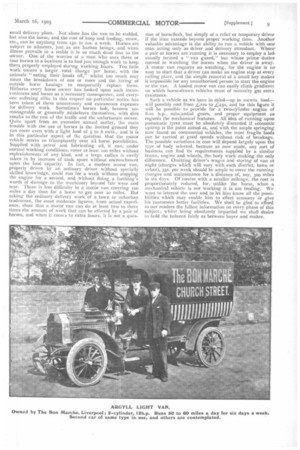The Light Delivery Van.
Page 8

Page 9

If you've noticed an error in this article please click here to report it so we can fix it.
Its Advantages over the Horse-drawn Vehicle.
Iti the missionary effort a Inch this journal is initiating to bring the user and the manufacturer into closer connection, there is no intention to forget for a moment the part which must inevitably be enac:ed by the light delivery van in revolutionising modern business methods. Some of the motor firms who have ventured to turn out light vans have handled the 'natter in a tentative way, and do not accoun: the results to be satisfactory. The more enterprising firms who have had the forethought to keep the van apart from the pleasure car are seeing demands in front of them which far exceed their most optimistic expectations. From information within our knowledge, enquiries are pouring into the offices of the progressive firms, and week by week these enquiries arc materialising .into substantial orders. But the position attained already by such firms in the industry is due to a proper consideration of the possible factors which make for success. Even as far back (comparatively) as 1899 and tow many retail users were keen to appreciate the saying to be derived from mechanical traction, and the splendid advertisement which up-to-date means of delivery would bring in their train. Retailers, in many branches of trade, such as drapers, general stores, etc., etc., were faced after a few months' use by large bills for repairs, and were compelled 10 give up their experiments. The reasons for discarding mechanical vehicles were not far to seek, and were quite apart from anything to do with the actual daily rounds. In their haste to secure orders the motor manufacturers entirely overlooked the different conditions under which pleasure ears and business vehicles would have to run, and contented themselves with fitting a van body on to the same chassis or frame which was designed for a pleasure car, which can only be successful when the load to be carried is no heavier than the proper complement of passengers would have been. In numberless instances the trouble was increased by fitting solid tyred wheels on to a light car frame—the disastrous results can be recalled by those who have followed the history of the van movement. Herein lay the whole source of trouble, for the engine and framework were not strong enough to withstand the vibration set up by solid tyres on a vehicle designed for different use. We need hardly point out that too+ has seen a vast alteration in the ideas in manufacturers' minds as to what constitutes a light van, and loos shows us that there are a number of firms who are fully alive to the requirements of the retail tradesman. The experimental stage has been passed through, and those who are thinking of placing orders need have no hesitation in the certainty of successful results. Experience has brought out where it was essential to strengthen parts or to alter designs, and the many British firms who are now buildingthe type of vehicle we have in mind can be relied upon to supply something entirely suitable to a particular trade or business. The many arguments in favour of the use of a mechanically-propeiled vehicle have not, we believe, been properly placed before those who are likely to be buyers. We are not referring to firms who own m to zo vehicles and upwards, bti:-. rather to that much larger class of retail business men who own one to a dozen vans, together with the horses to work them. Let us consider for a moment the difficulties which face the present horse user with a small delivery plant. Not alone has the van to be stabled, but also the horse, and the cost of keep and feeding, straw, etc., can be anything from iss. to zus. a week. Horses are subject to ailments, just as are human beings, and when illness prevails in a stable it is so much dead loss to the owner. One ofthe worries of a man who uses three or tour horses in a business is to find just enough work to keep them properly employed during working hours. Too little work means a larger total charge per horse, with the animals " eating their heads off," whilst too much may mean the breakdown of one or more and the hiring of outside horse haulage to temporarily replace them. Hitherto every horse owner has looked upon such inconveniences and losses as a necessary consequence, and everyone suffering alike in this respect no particular notice has been taken of these unnecessary and extraneous expenses for delivery work. Sometimes horses bolt, become unmanageable or generally misbehave themselves, with dire results to the rest of the traffic and the unfortunate owner. Quite apart from an excessive annual outlay, the main trouble with the use of horses is the limited ground they can cover even with a light load of sto fi cwts., and it is in this particular aspect of the question that the motor vehicle scores so triumphantly over all horse possibilities. Supplied with petrol and lubricating oil, it can, under normal working conditions, cover at least loo miles without replenishments of any kind, and a large radius is easily taken in by increase of tank space without encroachment upon the load capacity. In fact, a modern motor van, properly driven by an ordinary driver without specially skilled knowledge, could run for a week without stopping the engine for asecond, and without doing a farthing's worth of damage to the machinery beyond fair wear and tear. There is less difficulty in a motor van covering too miles a day than for a horse to get over zo miles. But taking the ordinary delivery work of a town or suburban tradesman, the most moderate figures, from actual experience, show that a motor van can do at least. two to three times the amount of work that can be effected by a pair of horses, and when it comes to extra hours, it is not a ques
tion of horseflesh, but simply of a relief or temporary driver if the time extends beyond proper working time. Another' valuable advantage is the ability to run a vehicle with on man acting only as driver and delivery attendant. Where
a pair ot horses are running it is necessary to employ a lad. usually termed a " van guard," but whose prime' duties: consist in watching the horses when the driver is away. A motor van requires no watching, for the engine is so easy to start that a driver can make an engine stop at every calling place, and the simple removal of a small key makes it impossible for any unauthorised person to start the engine or the van. A loaded motor van can easily climb gradients on which horse-drawn vehicles must of necessity get extra assistance.
Such a vehicle as we have in mind—up to iocwts. load— will possibly cost from £220 to Lzso, and for this figure it will be possible to provide for a two-cylinder engine of 8-to subs..antial gears, and proper equipment as regards the mechanical features. All idea of running upon pneumatic tyres must be absolutely discarded if economic upkeep is the point aimed at, and with the ample springing now found on commercial vehicles, the most fragile loads can be carried at good speeds without risk of breakage. The possible variations in cost will depend largely upon the type of body selected, because as now made, any sort of business can find its requirements supplied by a similar frame, engine and wheels, the body work making the only difference. Omitting driver's wages and storing of van at night (charges which will vary with each district, town or urban), 3ss. per week should be ample to cover the running charges and maintenance for a distance of, say, 300 miles in six days. Of course with a smaller mileage, the cost is proportionately reduced, for, unlike the horse, when a mechanical vehicle is not working it is not feeding. We want to interest the user and to let him know all the possibilities which may enable him to effect economy or give his customers better facilities. We shall be glad to afford to our readers the fullest information on every phase of this subject; whilst being absolutely impartial we shall desire to hold the balance fairly as between buyer and maker.
























